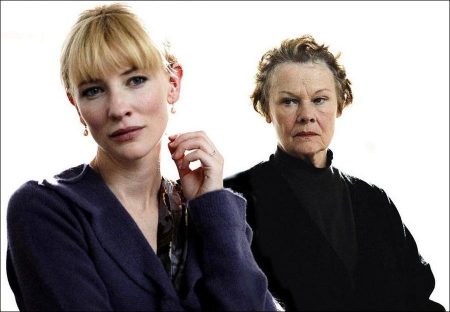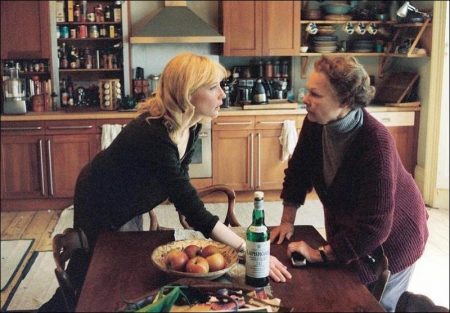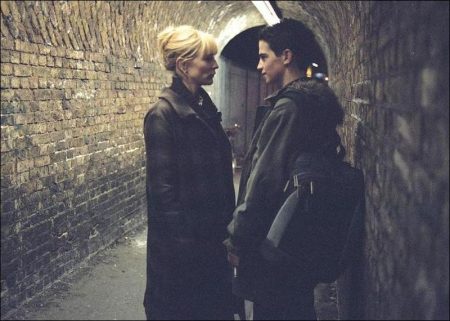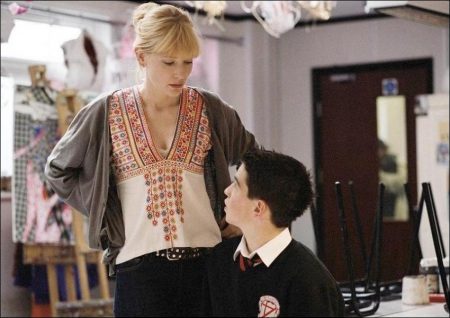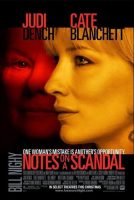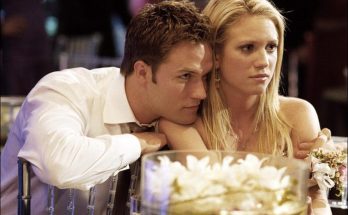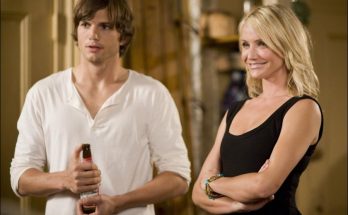Tagline: One woman’s mistake is another’s opportunity.
“People have always trusted me with their secrets. But who do I trust with mine?” — Barbara Covett, Notes on a Scandal.
Two women caught up in a drama of need and betrayal are at the heart of this psychological thriller, Notes on a Scandal. The twists and turns of the story are noted in the acerbic diary of Barbara Covett (Dame Judi Dench), a domineering and solitary teacher who rules with an iron fist over her classroom at a decaying state-run secondary school in London.
Save for her cat, Portia, Barbara lives alone, without friends or confidantes – but her world changes when she meets the school’s new art teacher, Sheba Hart (Cate Blanchett). Sheba appears to be the kindred spirit and loyal friend Barbara has always been seeking.
But when she discovers that Sheba is having an incendiary affair with one of her young students (Andrew Simpson), their budding relationship takes an ominous turn. Now, as Barbara threatens to expose Sheba’s terrible secret to both her husband (Bill Nighy) and the world, Barbara’s own secrets and dark obsessions come tumbling to the fore, exposing the deceptions at the core of each of the women’s lives.
Notes on a Scandal is a 2006 British psychological thriller-drama film, adapted from the 2003 novel of the same name by Zoë Heller. The screenplay was written by Patrick Marber and the film was directed by Richard Eyre and starred Judi Dench and Cate Blanchett. The soundtrack was composed by Philip Glass.
It was nominated for four Academy Awards – Best Actress, Best Supporting Actress, Best Adapted Screenplay, and Best Original Score. Filming took place in August and September 2005. The film was mainly shot on location in the Parliament Hill, Gospel Oak and Camden Town areas of northwest London.[citation needed]
A Scandal Begins
“Now more than ever, we are bound by the secrets we share.” — Barbara Covett
In this age of loneliness, isolation and disconnect, we live in cities that house millions of people yet everyone at one time or another yearns for companionship, for someone to reach out and connect with us on some level…any level.
This is the universal feeling that comes through in Zoë Heller’s 2001 pageturner of a novel, What Was She Thinking: Notes On a Scandal, a suspenseful story of loneliness and obsession that cuts, with equal parts dark humor and realism, right to the shadowy center of the human yearning for connection. Readers were drawn in by Barbara Covett’s blisteringly funny, yet ultimately deceptive, revelations about her so-called friendship with fellow teacher, Sheba Hart.
Between Sheba’s dangerously ill-conceived affair with a student and Barbara’s own “spin” and hidden agenda, what might have been merely a character study unfolded more like a thriller. Eventually, the book would garner not only widespread acclaim but numerous awards, including being short-listed for the coveted Man Booker Prize for English literature. The rights were quickly acquired by leading producers Scott Rudin and Robert Fox, who also recently brought Michael Cunningham’s beloved, multi-stranded novel The Hours to the screen. Rudin had already contracted with leading playwright and screenwriter Patrick Marber to tackle the adaptation, knowing he would create a brilliant screenplay.
When noted theatre and film director Richard Eyre was approached by Rudin and Fox about directing the film version of NOTES ON A SCANDAL he, like so many others, had already read the book. Eyre had found it at once funny, touching and beautifully observed — precisely the kind of material that intrigues him. Says Eyre: “I saw it as a story of friendships and sexual intoxications. It’s really a tale of two obsessions, of two women in the grip of their own self-destructive, uncontrollable passions.
Eyre and Rudin had previously collaborated with great success, along with Judi Dench, on the acclaimed Iris, the film about the extraordinary life-long love affair between the brilliant author Iris Murdoch and her devoted husband, John Bayley as well as the critically lauded stage production Amy’s View. Iris garnered both an Oscar and Golden Globe for Jim Broadbent, as well as Oscar and Golden Globe nominations for Dench and Kate Winslet.
Eyre next directed the critically praised Stage Beauty, a comedy-drama set on the 17th Century London stage, but had since returned to the theatre, directing two highly successful and utterly opposite productions: the new musical stage version of Mary Poppins in London and on Broadway and his fresh adaptation of Henrik Ibsen’s classic drama Hedda Gabler in London’s West End.
“I’d just done the two extremes of the spectrum in theatre – so to get back to filmmaking with a project with the fantastic credentials of NOTES ON A SCANDAL was irresistible,” he comments. Marber’s adaptation would be challenging, as Heller’s novel was written as a series of highly subjective journal entries in the pen of Barbara Covett which he masterfully crafted as diary entries, slowly revealing through her unreliable words the depths of her delusions and manipulations when it came to Sheba Hart.
But based on Marber’s previous body of work, there was no doubt that he was up to the task. He recently came to the fore as the author of the play Closer, a darkly funny look into the realities of love and desire which won the Olivier, Evening Standard and both London and New York Critics Circle Awards for Best Play before going on to write the adaptation of the acclaimed feature film.
Now, Marber had to come up with a way to turn Zoë Heller’s distinctly literary approach to the story of Barbara and Sheba into something far more dynamic, immediate and cinematic. “I did find writing this screenplay very difficult,” admits Marber, “but I was greatly helped by Scott Rudin, who pushed me through every draft. The novel is so rich and expansive that the job was to find a way to somehow compact all this into the story.”
That essence – at once comic and observant – became key to what Marber hoped to create in scenes of witty, tense and revealing dialogue. He carved the story around the book’s most relevant and pressing theme: the overwhelming isolation that wreaks so much havoc in modern lives, which is the ultimate undoing of Barbara Covett. “I hope the film says about a particular kind of modern loneliness, the desperation one can experience even in a city of millions that I think that everyone feels at times,” he says.
For Heller, Marber was an inspired choice to attempt the feat. “With Patrick Marber, I felt I’d gotten the most interesting and clever screenwriter possible,” she comments. “He was able to take what I had written and make something new out of it. He’s done an amazing job of turning it into something that really works on screen. I like to think my book was a page-turner, but he upped the excitement and the suspense of the book, which is all for the good.”
Marber began by exploring the story’s two main characters, starting with Barbara, the unforgettable narrator who comes to harbor corrosive secrets about her new “best friend,” Sheba Hart. Says Marber: “I thought Zoë had done such a brilliant job that it was all there waiting for me in the book. I was very faithful to what Zoë had written about Barbara. The thing that’s really different in the novel is that Barbara is telling the story from her point of view, so my job was to try to bring a more objective ballast to who she is, but at the same time keep her persona as this prickly, funny, at times stoic, figure. She’s no-nonsense, but she’s also got this aching, beating, vulnerable heart, and is someone who has never known love. Everything she does is out of a desperate loneliness and yet, at the same time, she’s a monster. I’ve always been attracted to characters who you love and despise simultaneously, and Barbara inspires both reactions.”
Marber felt a similarly invigorating conflict towards the character of Sheba. “I gave Sheba a slightly more offbeat, bohemian background than she has in the book, but her vulnerabilities and complicated feelings remain the same,” he comments.
Upon reading the completed screenplay, Richard Eyre was impressed with Marber’s skill at shifting the story from the subtlety of the page to the grander scale of the big screen, turning Barbara’s journal entries into palpably realistic scenes. “It was especially wonderful how he was able to keep the narrative in Barbara’s point of view, yet with a minimum of voice-over, avoiding the dangers of the relentless narrator,” comments the director.
Also important to Eyre was the screenplay’s honest handling of the highly topical but definitely controversial notion of a middle-aged, married teacher carrying on a torrid affair with her underage student.
“It was important that the relationship between Sheba and Steven be presented truthfully, by which I mean that the audience sees that it’s hinged on both a passionate, sexual attraction and a kind of tenderness and mutual curiosity,” Eyre comments. “I mean clearly what Sheba’s doing is deeply wrong, but there’s a delicate balance we wanted to strike of showing the honest truth of her relationship without in any way romanticizing it.”
Ultimately, Eyre was most pleased by how the screenplay seemed to capture the irresistible speed and fearless verve of Heller’s novel, while retaining its rich emotions of laughter, horror and grief – which he knew would be heightened further via the film’s visual style and performances.
“I really hope people find this film funny, as well as occasionally frightening, shocking and sad,” Eyre sums up. “There is something at once comical, ghastly and terribly human about this delusion that Barbara has that she will have a passionate, lifelong friendship with Sheba. And Barbara’s feelings for Sheba are analogous to Sheba’s feelings for Steven, the schoolboy. These two women are not in control – any more than any of us are in control when it comes to love.”
The Secret Keeper
“In a different (better) age, we would be ladies of leisure, lunching together, visiting galleries, traveling, putting the world to rights… we would be companions.” — Barbara Covett
With Zoë Heller’s novel, What Was She Thinking: Notes on a Scandal, Barbara Covett became one of the most fascinating unreliable narrators in contemporary literature.
To play such a complex, dangerous woman, the filmmakers knew early on they would need one of the finest actresses working in film today – it was then that Scott Rudin approached Dame Judi Dench very early on in the project’s genesis. Dench has riveted screen-goers in a wide variety of roles, including her Oscar winning turn as the Queen of England in Shakespeare in Love, her lauded role as Iris Murdoch at the end of her life in Iris, and another Oscar-nominated role in the recent Mrs. Henderson Presents.
From the moment Rudin read the novel, he knew it had to be Dench to play the part of Barbara. Rudin realized there was no other actress alive today that could pull off this role with the determination and resolve that the character demanded.
At first, Dench was quite taken aback by Barbara’s acid tongue and dark, wounded heart, not to mention her manipulative relationship with Sheba Hart. “It’s a really shocking story,” says Dench of her initial reaction to NOTES ON A SCANDAL. “But the challenge of doing it was very exciting to me. It was thrilling to be asked to do something that couldn’t be more different from anything I’ve ever played before.”
It was precisely that difference that Richard Eyre felt made Dench a perfect match for the unpredictable nature of the character. “Judi Dench is universally loved and people usually identify with this magnificently generous, beautiful and brilliant person who often plays monarchs and has tremendous personal dignity,” he remarks. “So to experience Judi Dench being caustic and acerbic and rather ungenerous we felt would be a wonderful, bracing shock. I mean, her portrait of Barbara is still deeply vulnerable, but this is not a nice woman and I think from an audiences’ point of view to see Judi playing that will be quite refreshing.”
Zoë Heller had a similar feeling. “In casting Judi Dench, one knows she will bring an intelligence and vulnerability to the role. She’s not just a stage villain twirling her mustache and plotting the downfall of others, but someone who does real justice to the humor of the role,” she says.
Having read both the book and the screenplay, Dench notes her pleasure at Patrick Marber’s adaptation. “I thought it was very skillfully adapted. It’s quite faithful to Zoë Heller’s style while still being very individual to Patrick,” she observes.
Dench was also pleased that the screenplay steadfastly refused to place damning judgments on its wayward characters. “I think it’s very much left to the audience to make up its own mind on the ethics of it all and I think that’s right,” she notes.
Indeed, as wicked as Barbara can be when she feels slighted or rejected, Dench also found elements of her character quite familiar and at times, devastatingly poignant. “I’ve known several people like her,” she says. “A very, very lonely person who craves affection and to have any friend of some kind. I think there are a lot of people out there just like that who have been lonely all their lives and dream of friendship. But when Barbara essentially blackmails Sheba Hart into becoming close to her, that’s when things turn nasty.”
To get deeper into Barbara’s desperation, Dench worked closely with Cate Blanchett to develop just the right rapport between the two unlikely comrades. “It was very intense and very, very hard work but we had a lot of laughs and she was terrific,” says Dench. “She is a phenomenal actress and she was phenomenal to work with. I think she is just fantastic, imaginative and quite inspirational.”
Another draw for Dench was getting yet another chance to work with director Richard Eyre. “He has such wonderful instincts,” she comments. “You feel very secure in his company because he knows what he wants but, within that parameter, he also allows you to really breathe and that’s very exciting.”
The Scandal Maker
“This voice inside me was going, why shouldn’t you be bad? Why shouldn’t you transgress?” — Sheba Hart
While Barbara Covett secretly hopes for a life-long friendship with Sheba Hart, Sheba unwittingly seals the deal by following her own precarious desires – betraying her loving, older husband and family by diving headlong into an affair with one of her own teenaged students. With Sheba’s scandalous behavior and her frantic need to keep it a secret, Barbara gains the upper hand . . . or so she thinks.
The delicate nature of Sheba’s encounters with both Barbara and the schoolboy Steven called for an actress of consummate skill, so it immediately made sense to the filmmakers to pair Judi Dench with Cate Blanchett – Blanchett having garnered an Oscar nomination starring in the title role of Elizabeth most recently won the Academy Award for Best Supporting Actress with a spirited turn as screen legend Katherine Hepburn in Martin Scorsese’s The Aviator. But as with Dench, the role of Sheba would take Blanchett far from those more regal performances.
Patrick Marber had always envisioned Cate Blanchett as Sheba. “When I was writing the screenplay, I became even more certain that she had to play Sheba,” says Marber. Friends for many years, heknew she would be perfect for the role. “I know Cate socially and we’re pals, but I’ve never worked with her before. And I couldn’t be more thrilled with her performance. I think she’s really raw in a way that I think will shock people.”
Zoë Heller found Blanchett’s casting eerily close to what she had always imagined Sheba to be like as a person. “Cate is as damn near an incarnation of what I had in my head as you could get,” she says. “So it was like having a dream and then seeing it acted out before you.”
From her first encounter with Heller’s book, Blanchett herself was compelled. “It’s an absolute pageturner,” she says. “It’s all told from Barbara’s perspective so the challenge for Patrick Marber as the screenwriter and for me as an actor was to liberate Sheba from Barbara’s point of view for the film, to make her live and breathe in her own right. Ultimately, on the screen, I think the two women hold up a mirror to one another.”
“Marber actually turned and adapted the novel into its own creature, which is often I think the trick to making an adaptation work,” says Blanchett. “I’ve been involved in several adaptations where they’ve almost been too slavish to the form that the novel has taken and you really need to liberate yourself from that in order to make the film live and breathe in its own right.”
Blanchett was excited to get a chance to explore Sheba from several angles, none of them easy or simple. “Cinematically, I think to spend time with someone who transgresses a moral boundary like Sheba does, you have to go deep inside who that woman is,” she explains. “There are a number of things in the novel that really struck me and I hope I’ve brought them to the film. Sheba’s a young woman who has married an older man, who feels she has sort of whittled away her youth and has found herself feeling hopelessly without accomplishment or any sense of larger meaning. She’s ready to change her life and, in a strange way, her opening act of rebellion is this relationship with a 15 year-old boy. You could say she’s trying to recapture her lost youth. It seems she’s unable to function in the grown-up world and part of her journey is accepting that she is a product of her own choices.”
The irony of Sheba, Blanchett notes, is that Barbara enviously believes her to be entirely privileged and happy. “From Barbara’s perspective, Sheba has the gift of being in a loving marriage and being surrounded by people who adore her – but Sheba feels just as profoundly, deeply lost and isolated,” she observes.
Yet for all her understanding of how Sheba ends up in her scandal-ridden position, Blanchett still found it a serious challenge to embody the character’s unlawful desires. “It’s really been the hardest journey of connection I’ve ever had with a character,” she admits, “because I could understand having a relationship with a much older man but I look at a 15 year-old boy and all I see is a child. But I think Sheba herself is surprised by it. She’s not someone who has targeted a child. Rather, I think she would say in the beginning that this is a great love – but part of her journey is to be boldly and frighteningly revealing to her inner self.”
Indeed, Blanchett believes that Sheba was already on a collision course with radical change in her life even before Barbara began playing her dangerous games. “I feel if Sheba had ended the affair when she told Barbara she had, she would still have done something else to upset her life,” the actress says. “People who are hidden from themselves will create all kinds of circumstances to expose themselves. I think Sheba gives herself an intellectual excuse for the attraction. She idealizes the notion of taking a working class boy and introducing him to art and life. But, of course, in the end, attraction to another person is a deeply subconscious thing that can’t be simply explained.”
In working with Richard Eyre and the film’s artistic crew, Blanchett was taken with their consistently careful approach. “I don’t think you can deal with this kind of subject matter without a touch of humor and irony and visual warmth, and they brought all of that,” she remarks. “I’ve always seen the story as being a distinctive portrait of loneliness and that’s definitely the way Richard has shepherded the film. He’s been incredibly focused on the actors and created the best possible environment to deliver a performance.”
Eyre, in turn, was delighted with Blanchett’s embracing of Sheba both light and dark. Remarks the director: “Cate comes to the set prepared for all eventualities, and is therefore able to be truly spontaneous. She has a tremendously deep knowledge of each scene, and contributes a great deal in details and big ideas. As Sheba, she is able to portray a woman who is unguarded to the point of self destruction, and I admired Cate’s courage as well as her skill in doing that so beautifully.”
Eyre was especially moved by Blanchett’s delicate dance of attraction and fear with Steven as played by young Andrew Simpson. “I think those scenes between them are very, very powerful and wholly plausible because not only have you got two good actors but you’ve got the generosity of Cate with a much younger actor, and her brilliance at handling awkwardness and her ability to make sure that it comes off as intimate and true without being romanticized,” says Eyre.
He adds: “I’m weary of superlatives, but in the case of Cate and Judi, it would be indecent not to apply them because they are both such extraordinarily skillful actors.”
Notes on a Scandal (2006)
Directed by: Richard Eyre
Starring: Cate Blanchett, Judi Dench, Bill Nighy, Andrew Simpson, Phil Davis, Michael Malonay, Juno Temple, Joanna Scanlan, Emma Kennedy, Wendy Nottingham, Tameka Empson
Screenplay by: Patrick Marber
Production Design by: Tim Hatley
Cinematography by: Chris Menges
Film Editing by: John Bloom, Antonia Van Drimmelen
Costume Design by: Tim Hatley
Set Decoration by: Caroline Smith
Art Direction by: Hannah Moseley, Mark Raggett
Music by: Philip Glass
MPAA Rating: R for language and some aberrant sexual content.
Distributed by: Fox Searchlight Pictures
Release Date: December 25, 2006
Visits: 53
